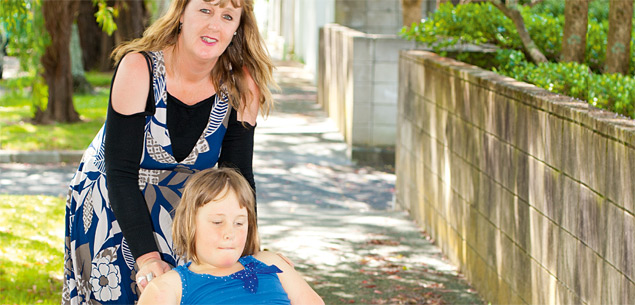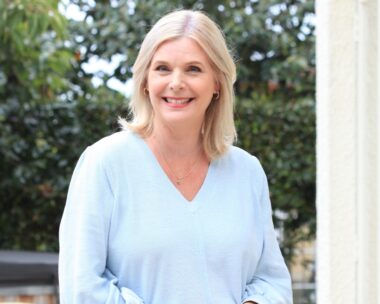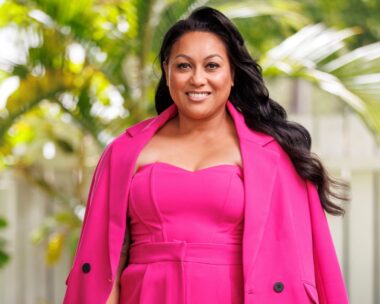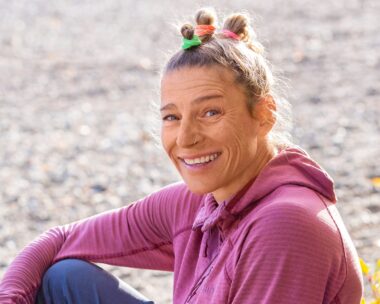For most children, learning to ride a bike is a Kiwi rite of passage, but for Charlotte Cleverley-Bisman, it requires a team of experts. Like many of life’s simple pleasures, bike riding is another activity that will take her weeks to master.
A trike was one of Charlotte’s birthday presents when she turned nine last week. The Waiheke Islander, who made headlines as “Baby Charlotte” when she partially lost her limbs to meningococcal disease in 2004, is now walking and even running with assistance.
Learning to ride her new bike is next on her list of challenges. She tells her mother Pam Cleverley there’s not much she can’t do, and once she can ride her trike she will have more opportunities to play with her friends.
“Last year when she turned eight I thought, ‘I really need to have something that makes her included in society and gets her heart pumping,’ and I wondered if there was a bike out there that could possibly work for her,” says Pam.
The new bike was given to Charlotte by Variety – The Children’s Charity. It cost around $8000 and was made by Trikes New Zealand, which produces custom-made bikes for riders with disabilities. It was adapted for Charlotte with the help of the Auckland Limbs Centre.

‘My job is to show that, with a little imagination, Charlotte can be able,’ says Pam.
“I can’t wait to see her at school with a whole crowd of children running behind her,” says Pam. “It’s going to be another wow factor and it’s going to take the emphasis off her disability – which is a word that I hate,” says Pam.
Charlotte goes to Waiheke Primary School and has become used to hiding her feelings when she isn’t included in other children’s fun.
“Kids are kids,” says Pam. “They all love her and say, ‘Hi Charlotte’ and ‘Bye Charlotte,’ but it’s hard for them to incorporate her into their games. I’ve been going to school and bringing games that incorporate all kids. And if there’s any running involved then Charlotte gets a head start.”
That’s what happened at the Waiheke combined primary schools’ athletics day, when Charlotte won the 100m race by running 50m on her “runners” (specifically designed prosthetics with blades), crossing the finish line just ahead of her competitors with the assistance of her mum and teacher aide Annie Hall.
“She needs access to things to make her able, and I find society can disable her,” says Pam. “My job is to show society that, with a bit of imagination, she can be able. And that’s what this bike is about. People are going to be blown away when they see she can bike; but of course she can, she can swim and do lots of things – she’s going to do them her own way.”
The family has become used to being stared at in public, but Charlotte’s got the perfect retort to questions about what happened to her limbs, responding, “I didn’t feed my dragon.”
The adoption of a mobility assistance dog is another plan to help improve Charlotte’s life. A labrador is being trained to bring Charlotte her prosthetics and help her get dressed. “At school the dog will also bring kids to her,” says Pam.

Charlotte survived her battle with meningococcal disease against the odds, and it’s that same fighting spirit that sees her keen to give everything a go.
While Charlotte is still growing, she needs new prosthetics as often as children need new shoes and they’re painful for her to walk in. Last year a fundraising campaign helped Charlotte visit Camp No Limits, a US camp for children with limb loss. Her mentor Cameron Clapp spent a week training her to walk in her new prosthetics, urging her to persevere through the pain.
It’s hoped that Charlotte will one day be able to have robotic prosthetics, which use sensors to anticipate the body’s movements, but the computerised limbs can cost up to $85,000.
“That’s a lot of what her Trust is about,” says Pam. “We’re building it up so she can get her high-tech ones when she’s 18. But right now we just have to stick with what the government provides.”
For now it’s the trike that Pam hopes will see Charlotte on the move. And when she is peddling it on her own, it will be another golden moment for the family. These are rare, Pam says, but extra special when they arrive.
“The highs wouldn’t be so high if the lows weren’t so low.”
To help more Kiwi kids like Charlotte, visit variety.org.nz.




